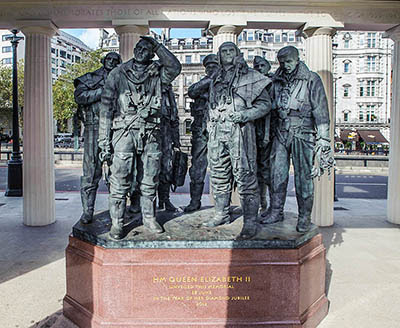Flying Officer Robert Harris, Pilot
 |
| Robert Harris in uniform at the Duck's Unlimited offices prior to heading overseas, Source: Betty Hannem |
Harris returned to Canada on his own in 1939 to work as a naturalist in charge of wildlife management on the Big Grass Marsh, Ducks Unlimited's first restoration project in Manitoba. It was in the nearby town of Langruth that Harris met his future wife Margaret.
Robert and Margaret married in April 1942 and he enlisted in the Royal Canadian Air Force (RCAF) in October of that year. During pilot training in Brandon, Dauphin, Regina, Saskatoon and Maitland, Nova Scotia, Harris was described by his instructors to be a ‘sound pilot’, ‘a good officer who has been keen and hard-working at all times,’ mature, quiet, reserved and studious. Harris was sent overseas at the end of March 1944 for further training. He was working on advanced flight training near Oxford when on July 31, 1944 (Harris’ 31st birthday), daughter Betty was born.
Serious, and family-focused, Harris would spend most of his leaves from base with his parents who were living in Newark in Nottinghamshire, UK. Harris maintained a keen interest in cycling, photography and nature even when stationed overseas. Although he was unable to personally review the final proofs of his manuscript, his study of the nesting habits of the chestnut-collared longspur would be published in June 1944 by the Wilson Bulletin, a quarterly scientific journal published by the Wilson Ornithological Society.
Harris was assigned, along with his crew, to 550 Squadron on January 8, 1945. Harris’ first live operation was as ‘Second Dickie’ to Flying Officer Kenneth Smith on Lancaster ME301 targeting the Zeitz Oil Plant on a flight January 16, 1945. Harris’ remaining seven missions would be with his own crew.
Harris was well respected by his crew. In a letter to Robert’s wife Margaret in June 1945, bomb aimer Gordon Nicol wrote “I never did meet anyone who had quite as high ideals as Bob, and I could go on at length about that.” Rear air gunner Douglas Hicks noted: “Our pilot was one who went by the book and we would always follow the assigned altitudes we were given at briefing. Secretly there were times when I wished he would cut a corner or two.”
Despite his disciplined personality, he also showed his poetic side in letters home. In a letter to Margaret in September 1944, Harris described himself as a disciple of Nature:
“As soon as this war is over I want to see in the sky, instead of massive planes, long flocks of ducks and geese, soaring dots that are hawks, and flitting bunches of swallow. Instead of rows of ugly huts and hangars, I want to see green slumps of poplars jutting into a blue sky. Instead of watching rows of dials, I want to watch the bright eyes and rapid movements of wild free creatures. I want to hear, instead of the thunder of engines, the forthright melody of a meadowlark or the still cooing of a dove. I want to see and hear and feel the undisturbed outdoor work again…”

Comments
Post a Comment